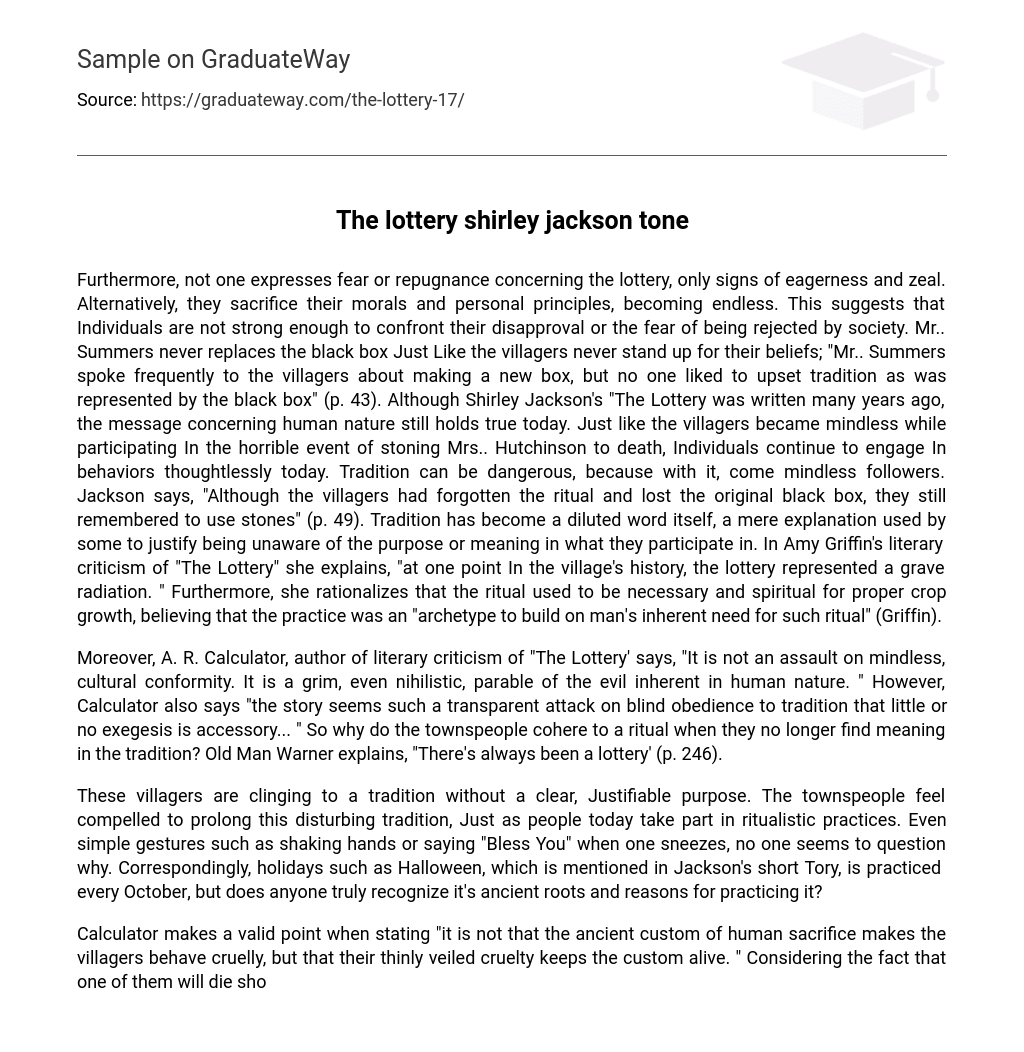Furthermore, not one expresses fear or repugnance concerning the lottery, only signs of eagerness and zeal. Alternatively, they sacrifice their morals and personal principles, becoming endless. This suggests that Individuals are not strong enough to confront their disapproval or the fear of being rejected by society. Mr.. Summers never replaces the black box Just Like the villagers never stand up for their beliefs; “Mr.. Summers spoke frequently to the villagers about making a new box, but no one liked to upset tradition as was represented by the black box” (p. 43). Although Shirley Jackson’s “The Lottery was written many years ago, the message concerning human nature still holds true today. Just like the villagers became mindless while participating In the horrible event of stoning Mrs.. Hutchinson to death, Individuals continue to engage In behaviors thoughtlessly today. Tradition can be dangerous, because with it, come mindless followers. Jackson says, “Although the villagers had forgotten the ritual and lost the original black box, they still remembered to use stones” (p. 49). Tradition has become a diluted word itself, a mere explanation used by some to justify being unaware of the purpose or meaning in what they participate in. In Amy Griffin’s literary criticism of “The Lottery” she explains, “at one point In the village’s history, the lottery represented a grave radiation. ” Furthermore, she rationalizes that the ritual used to be necessary and spiritual for proper crop growth, believing that the practice was an “archetype to build on man’s inherent need for such ritual” (Griffin).
Moreover, A. R. Calculator, author of literary criticism of “The Lottery’ says, “It is not an assault on mindless, cultural conformity. It is a grim, even nihilistic, parable of the evil inherent in human nature. ” However, Calculator also says “the story seems such a transparent attack on blind obedience to tradition that little or no exegesis is accessory… ” So why do the townspeople cohere to a ritual when they no longer find meaning in the tradition? Old Man Warner explains, “There’s always been a lottery’ (p. 246).
These villagers are clinging to a tradition without a clear, Justifiable purpose. The townspeople feel compelled to prolong this disturbing tradition, Just as people today take part in ritualistic practices. Even simple gestures such as shaking hands or saying “Bless You” when one sneezes, no one seems to question why. Correspondingly, holidays such as Halloween, which is mentioned in Jackson’s short Tory, is practiced every October, but does anyone truly recognize it’s ancient roots and reasons for practicing it?
Calculator makes a valid point when stating “it is not that the ancient custom of human sacrifice makes the villagers behave cruelly, but that their thinly veiled cruelty keeps the custom alive. ” Considering the fact that one of them will die shortly, there does not seem to be an abundance of signs of distress. This may be because the villagers have been brainwashed in a sense. The truth of the lottery is not unveiled until the end. The reader may question why it was described as a “civic activity’ (p. 43) in the beginning of the passage.





